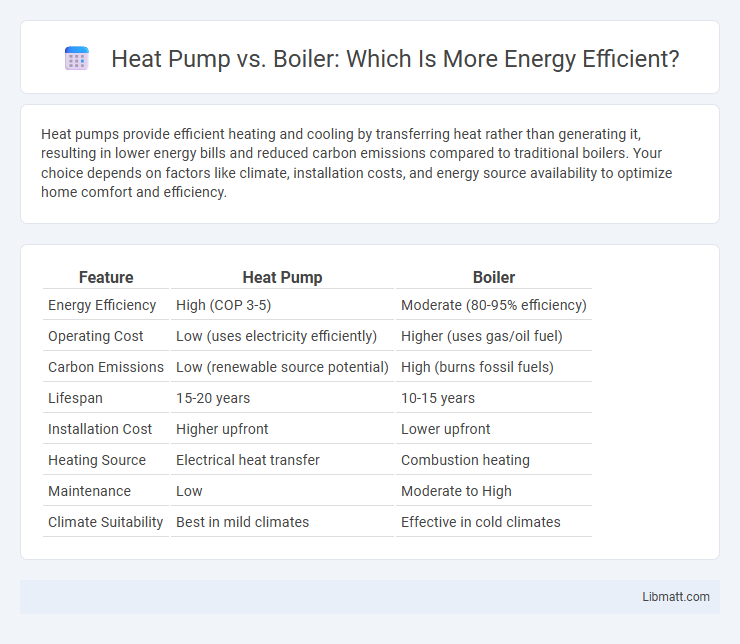Heat pumps provide efficient heating and cooling by transferring heat rather than generating it, resulting in lower energy bills and reduced carbon emissions compared to traditional boilers. Your choice depends on factors like climate, installation costs, and energy source availability to optimize home comfort and efficiency.
Table of Comparison
| Feature | Heat Pump | Boiler |
|---|---|---|
| Energy Efficiency | High (COP 3-5) | Moderate (80-95% efficiency) |
| Operating Cost | Low (uses electricity efficiently) | Higher (uses gas/oil fuel) |
| Carbon Emissions | Low (renewable source potential) | High (burns fossil fuels) |
| Lifespan | 15-20 years | 10-15 years |
| Installation Cost | Higher upfront | Lower upfront |
| Heating Source | Electrical heat transfer | Combustion heating |
| Maintenance | Low | Moderate to High |
| Climate Suitability | Best in mild climates | Effective in cold climates |
Introduction to Heat Pumps and Boilers
Heat pumps and boilers serve different purposes in heating systems, with heat pumps transferring heat from outside sources into your home and boilers generating heat by burning fuel or using electricity. Heat pumps offer high energy efficiency by leveraging ambient air, ground, or water heat, whereas boilers provide reliable, consistent heating through combustion or electric elements. Understanding these technologies helps you choose the most suitable option for your energy needs and climate conditions.
How Heat Pumps Work: Technology Overview
Heat pumps operate by transferring heat from outdoor air, ground, or water sources into your home using a refrigeration cycle, which includes an evaporator, compressor, condenser, and expansion valve. Unlike boilers that generate heat by burning fuel or using electricity to heat water directly, heat pumps extract and concentrate existing environmental heat, making them more energy-efficient. This technology provides both heating and cooling, adapting to seasonal changes while significantly reducing carbon emissions compared to traditional boiler systems.
Boiler Systems Explained
Boiler systems heat water to provide central heating and hot water through radiators or underfloor heating, relying on natural gas, oil, or electricity as fuel sources. They operate by burning fuel to heat water in a sealed vessel, offering efficient warmth but producing carbon emissions depending on the fuel type. Understanding your boiler's efficiency rating and fuel source helps you make an informed decision when comparing it with a heat pump for sustainable home heating.
Energy Efficiency: Heat Pumps vs Boilers
Heat pumps deliver higher energy efficiency by transferring heat rather than generating it, often achieving efficiencies of 300-400% compared to boilers' maximum of 90-95%. Boilers rely on fossil fuels and combustion processes that result in significant energy losses, while heat pumps use electricity to extract ambient heat from air, ground, or water sources. Seasonal Energy Efficiency Ratio (SEER) and Coefficient of Performance (COP) metrics commonly demonstrate heat pumps' superior energy savings and lower greenhouse gas emissions relative to traditional boiler systems.
Environmental Impact and Carbon Footprint
Heat pumps significantly reduce your carbon footprint by using renewable energy sources such as ambient air, ground, or water heat, resulting in lower greenhouse gas emissions compared to traditional boilers that rely on fossil fuels like natural gas or oil. Boilers emit higher levels of CO2 due to combustion processes, contributing more to air pollution and climate change. Transitioning to a heat pump system supports environmental sustainability by enhancing energy efficiency and minimizing harmful emissions.
Installation Costs and Maintenance
Heat pump installation costs typically range from $4,000 to $8,000, higher than boilers, which usually cost between $2,500 and $5,000. Maintenance for heat pumps involves regular filter changes and system checks to ensure efficiency, whereas boilers require annual inspections and potential safety checks for gas leaks or pressure issues. Your choice impacts long-term expenses, with heat pumps generally offering lower operational costs despite higher initial installation.
Performance in Different Climates
Heat pumps deliver optimal energy efficiency in moderate climates by extracting ambient heat from the air, achieving a coefficient of performance (COP) between 3 and 5. Boilers maintain higher heating capacity in colder climates by generating heat through combustion, ensuring stable indoor temperatures even below freezing conditions. Hybrid systems can combine these technologies to balance performance and energy use across varying seasonal temperatures.
Running Costs and Long-term Savings
Heat pumps generally offer lower running costs compared to boilers because they use electricity to transfer heat rather than generating it from fuel combustion, making them more energy-efficient. Over the long term, your savings increase significantly with a heat pump due to reduced energy consumption and eligibility for various government incentives promoting renewable energy use. Boilers, while often cheaper to install, tend to incur higher fuel costs and maintenance expenses, resulting in less favorable long-term financial benefits.
Which System Is Best for Your Home?
Choosing between a heat pump and a boiler depends on your home's climate, energy efficiency goals, and existing infrastructure. Heat pumps provide versatile heating and cooling with higher energy efficiency in moderate climates, while boilers deliver consistent heat in colder regions using natural gas or oil. Evaluating your local energy costs, installation space, and long-term savings helps determine which system best suits your home's comfort and sustainability needs.
Conclusion: Making the Right Choice
Choosing between a heat pump and a boiler depends on your home's insulation, climate, and energy efficiency goals. Heat pumps offer sustainable heating with lower carbon emissions and operational costs, especially in moderate climates. Boilers may provide more consistent warmth in colder regions, but selecting the right system ensures optimal comfort and long-term savings for your property.
Heat Pump vs Boiler Infographic

 libmatt.com
libmatt.com